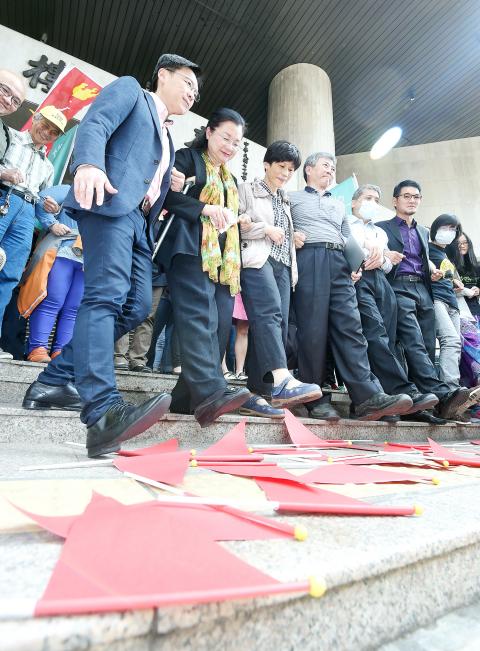Representatives from several environmental groups protested outside the Legislative Yuan yesterday morning, urging the government to set stricter regulations to prevent further deterioration of the air quality in southern Taiwan.
Protesters said that they were enraged by a statement made by Premier Mao Chi-kuo (毛治國), who said that people cannot find high-tech jobs in southern Taiwan.
The protesters said that what Mao will not find in southern Taiwan is clean air, which they need for a healthy life.

Photo: Fang Pin-chao, Taipei Times
They asked how people in the south are able to find jobs without being in good health.
Regulations say that schools are obliged to fly a red flag when the pollution standard index reaches 100 or PM2.5 levels exceed 36 micrograms (mcg) per cubic meter. The flag means that people with certain health issues should avoid outdoor activities and be aware of changes in their health.
PM2.5 is an indicator of airborne particles measuring 2.5 micrometers or less.
Citizen of the Earth Foundation Taipei office director Antonio Chou (周東漢) said that an experiment had been conducted in an elementary school in Kaohsiung’s Zuoying District (左營) from November last year to last month that showed a red flag was raised on 64 of the 85 school days during the period.
Chou said the findings showed that people in southern Taiwan should not engage in outdoor activities 75 percent of the time.
Foundation deputy executive director Wang Min-ling (王敏玲) said that she is used to wearing a face mask all year round having lived in the Kaohsiung-Pingtung County area for many years.
Wang said that the air is dense with particulate matter from autumn to spring, adding that the air quality changes for the better in summer, but ozone issues arise when the weather is hot.
The average ozone density in Kaohsiung’s Linyuan District (林園) in October last year was 58.5 parts per billion (ppb), which was higher than the government standard of 30ppb, she said.
She asked why 3.61 million residents in Kaohsiung and Pingtung County should continue putting up with contaminated air.
The PM2.5 standard set by the Environmental Protection Administration (EPA) for safe values is between 35mcg and 53mcg per cubic meter, she said, but the WHO has a 25mcg per cubic meter standard.
Using the WHO’s standard, children could never play outside, she said.
“A study showed that the risks of not exercising are similar to those associated with high blood pressure, Wang said. How can people in the south go outside and exercise in these circumstances?”
Taiwan Healthy Air Alliance founder Yeh Guang-peng (葉光芃) said that Puli Township (埔里) in Nantou County as well as Mailiao Township (麥寮) in Yunlin County have the poorest air quality in Taiwan.
While Puli residents are set to march on Saturday [tomorrow], the central government is still sleeping, Yeh said.
Chen Hsien-heng (陳咸亨), director-general of the EPA’s Department of Air Quality Protection and Noise Control, said that the administration is considering raising its standards for air quality.
However, its focus is on regulating pollutants at their source, Chen said.
Chen said that the move by six cities and counties in southern Taiwan to ban the burning of coke and coal was admirable, but a similar move nationwide would require further consideration.

Chinese Nationalist Party (KMT) Chairman Eric Chu (朱立倫), spokeswoman Yang Chih-yu (楊智伃) and Legislator Hsieh Lung-chieh (謝龍介) would be summoned by police for questioning for leading an illegal assembly on Thursday evening last week, Minister of the Interior Liu Shyh-fang (劉世芳) said today. The three KMT officials led an assembly outside the Taipei City Prosecutors’ Office, a restricted area where public assembly is not allowed, protesting the questioning of several KMT staff and searches of KMT headquarters and offices in a recall petition forgery case. Chu, Yang and Hsieh are all suspected of contravening the Assembly and Parade Act (集會遊行法) by holding

PRAISE: Japanese visitor Takashi Kubota said the Taiwanese temple architecture images showcased in the AI Art Gallery were the most impressive displays he saw Taiwan does not have an official pavilion at the World Expo in Osaka, Japan, because of its diplomatic predicament, but the government-backed Tech World pavilion is drawing interest with its unique recreations of works by Taiwanese artists. The pavilion features an artificial intelligence (AI)-based art gallery showcasing works of famous Taiwanese artists from the Japanese colonial period using innovative technologies. Among its main simulated displays are Eastern gouache paintings by Chen Chin (陳進), Lin Yu-shan (林玉山) and Kuo Hsueh-hu (郭雪湖), who were the three young Taiwanese painters selected for the East Asian Painting exhibition in 1927. Gouache is a water-based

Taiwan would welcome the return of Honduras as a diplomatic ally if its next president decides to make such a move, Minister of Foreign Affairs Lin Chia-lung (林佳龍) said yesterday. “Of course, we would welcome Honduras if they want to restore diplomatic ties with Taiwan after their elections,” Lin said at a meeting of the legislature’s Foreign Affairs and National Defense Committee, when asked to comment on statements made by two of the three Honduran presidential candidates during the presidential campaign in the Central American country. Taiwan is paying close attention to the region as a whole in the wake of a

OFF-TARGET: More than 30,000 participants were expected to take part in the Games next month, but only 6,550 foreign and 19,400 Taiwanese athletes have registered Taipei city councilors yesterday blasted the organizers of next month’s World Masters Games over sudden timetable and venue changes, which they said have caused thousands of participants to back out of the international sporting event, among other organizational issues. They also cited visa delays and political interference by China as reasons many foreign athletes are requesting refunds for the event, to be held from May 17 to 30. Jointly organized by the Taipei and New Taipei City governments, the games have been rocked by numerous controversies since preparations began in 2020. Taipei City Councilor Lin Yen-feng (林延鳳) said yesterday that new measures by